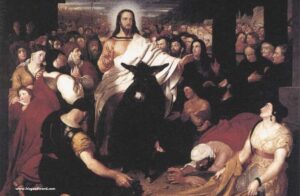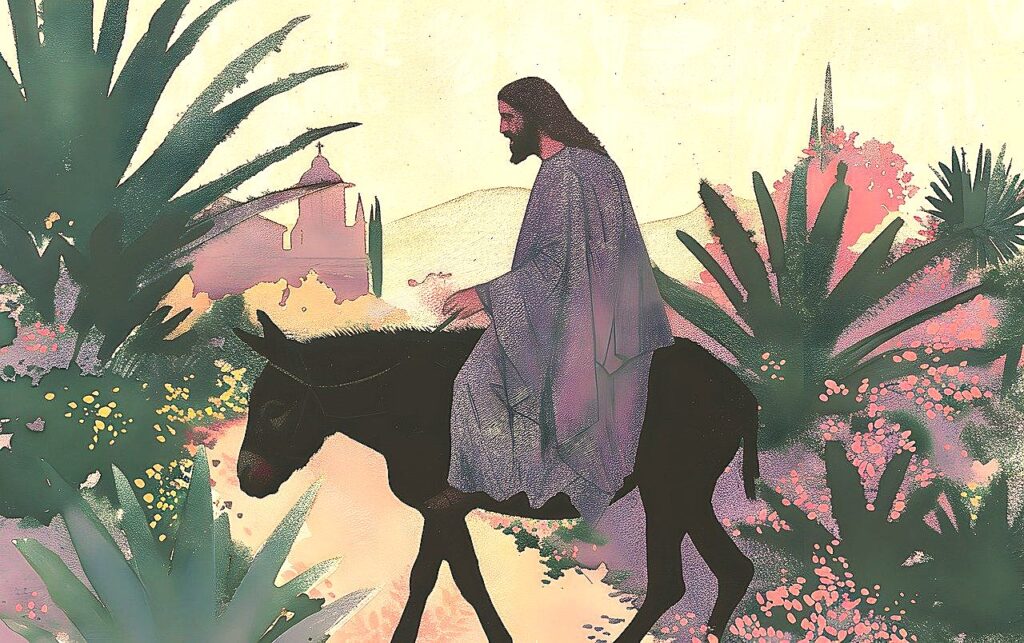Mark 11:1-33 King James Bible KJV

The Triumphal Entry, The Cursing and Lesson of the Fig Tree, Jesus Cleanses the Temple, Jesus’ Authority is Questioned
Mark 11:1-33 King James Bible KJV. Mark Chapter 11 is a critical chapter in the Gospel of Mark as it marks the beginning of the final week of Jesus’ life, often called the Passion Week, leading up to his crucifixion. It presents a series of events that demonstrate Jesus’ authority as the Messiah, the Son of God, and his judgment on the religious system that had become corrupt and fruitless.
The triumphal entry reveals Jesus as the Messiah, but not in the political sense that many expected. The cursing of the fig tree and cleansing of the temple symbolize God’s judgment on Israel’s spiritual barrenness and the corrupt religious practices in the temple. Jesus teaches that true faith, prayer, and forgiveness are the marks of genuine discipleship, not just outward religious observance. Finally, the confrontation with the religious leaders highlights their refusal to recognize Jesus’ authority, foreshadowing their role in his eventual crucifixion.
The overarching theme is the contrast between outward religious appearance and inward spiritual reality. Jesus calls for a kingdom built on faith, humility, and fruitfulness, in contrast to the empty and self-serving practices of the religious elite.
Mark 11:1-33 King James Bible KJV
—————-

The Triumphal Entry – verses 1-11
Jesus enters Jerusalem riding on a colt, which fulfills a prophecy from Zechariah 9:9 about the coming of a king who would bring peace. As Jesus enters, the crowds lay down cloaks and branches, shouting, “Hosanna! Blessed is he who comes in the name of the Lord!” They recognize him as the one bringing the kingdom of David.
- Messianic Identity: Jesus’ entry into Jerusalem riding a colt, as prophesied, affirms his role as the Messiah. The colt, a symbol of peace, contrasts with the image of a conquering king on a warhorse, suggesting that Jesus’ kingdom is not about military power but peace and righteousness.
- Public Acclaim and Expectation: The crowd’s response shows that many saw Jesus as the promised king, though likely expecting a political leader who would liberate them from Roman rule. Their misunderstanding of the nature of his kingdom would soon become apparent.

The Cursing of the Fig Tree – verses 12-14
The next day, Jesus sees a fig tree in leaf but finds no fruit on it. He curses the tree, saying, “May no one ever eat fruit from you again.” The fig tree later withers, and this act is symbolic.
- Symbol of Judgment: The fig tree, often a symbol of Israel in Scripture, represents Israel’s spiritual barrenness. Though it appears healthy (in leaf), it bears no fruit. Jesus’ curse reflects God’s judgment on the religious leaders and the temple system for their lack of spiritual fruitfulness despite their outward appearance of piety.
- Spiritual Fruitfulness: This passage also carries a broader message about the importance of genuine faith and spiritual fruit. Outward appearances or religious rituals are meaningless without true faith and obedience.

Jesus Cleanses the Temple – verses 15-19
Jesus enters the temple in Jerusalem and drives out the merchants and money changers, overturning their tables. He condemns them, saying, “Is it not written: ‘My house will be called a house of prayer for all nations’? But you have made it a den of robbers.” This act angers the chief priests and scribes, who begin plotting to kill him.
- Jesus’ Authority Over the Temple: This act asserts Jesus’ authority over the temple, symbolizing his role as the true high priest and showing that the temple had become corrupt. The merchants were exploiting worshippers, turning a sacred space into a place of profit.
- Restoring the Temple’s Purpose: Jesus’ actions are not just about removing corruption but restoring the temple to its intended purpose—as a place of worship for all nations. The reference to “all nations” points to the inclusiveness of God’s kingdom.
- Judgment on Religious Leadership: By disrupting the temple’s activities, Jesus directly confronts the religious leaders, whose authority is built on the temple system. This act foreshadows the judgment coming on the religious establishment.

The Lesson of the Withered Fig Tree – verses 20-26
The next morning, the disciples notice that the fig tree Jesus cursed has withered from the roots. Peter remarks on it, and Jesus uses the occasion to teach about faith. He tells the disciples that if they have faith in God, they can move mountains and receive whatever they ask for in prayer, provided they forgive others.
- Faith and Prayer: The withering of the fig tree reinforces the lesson that faith, not empty religious rituals, is what matters in the kingdom of God. Jesus calls for a faith that trusts fully in God’s power, which can even “move mountains” (a metaphor for overcoming obstacles).
- Forgiveness and Prayer: Jesus connects effective prayer with a heart of forgiveness. Unforgiveness can hinder one’s relationship with God and the efficacy of prayer. Genuine faith is accompanied by forgiveness, reflecting God’s mercy.

Jesus’ Authority Questioned – verses 27-33
Jesus returns to the temple, and the chief priests, scribes, and elders confront him, asking by what authority he does these things. Jesus responds with a question about the baptism of John the Baptist: Was it from heaven or from men? The religious leaders are trapped in a dilemma—if they say “from heaven,” they must explain why they didn’t believe John, but if they say “from men,” they fear the people who regarded John as a prophet. They choose not to answer, so Jesus also refuses to tell them by what authority he acts.
- Challenge to Jesus’ Authority: This exchange highlights the tension between Jesus and the religious authorities. They refuse to recognize his divine authority, instead focusing on maintaining their own power and position.
- Spiritual Blindness of the Leaders: The religious leaders’ refusal to answer Jesus’ question shows their spiritual blindness and unwillingness to accept the truth. They are more concerned with their own safety and reputation than with seeking the truth.
- Jesus’ Authority Comes from God: Though Jesus does not directly state it, the passage implies that his authority comes from God, as does John the Baptist’s. The religious leaders’ inability to acknowledge this further condemns them.
Mark 11:1-33 King James Bible KJV
1 And when they came nigh to Jerusalem, unto Bethphage and Bethany, at the mount of Olives, he sendeth forth two of his disciples,
2 And saith unto them, Go your way into the village over against you: and as soon as ye be entered into it, ye shall find a colt tied, whereon never man sat; loose him, and bring him.
3 And if any man say unto you, Why do ye this? say ye that the Lord hath need of him; and straightway he will send him hither.
4 And they went their way, and found the colt tied by the door without in a place where two ways met; and they loose him.
5 And certain of them that stood there said unto them, What do ye, loosing the colt?
6 And they said unto them even as Jesus had commanded: and they let them go.
7 And they brought the colt to Jesus, and cast their garments on him; and he sat upon him.
8 And many spread their garments in the way: and others cut down branches off the trees, and strawed them in the way.
9 And they that went before, and they that followed, cried, saying, Hosanna; Blessed is he that cometh in the name of the Lord:
10 Blessed be the kingdom of our father David, that cometh in the name of the Lord: Hosanna in the highest.
11 And Jesus entered into Jerusalem, and into the temple: and when he had looked round about upon all things, and now the eventide was come, he went out unto Bethany with the twelve.

12 And on the morrow, when they were come from Bethany, he was hungry:
13 And seeing a fig tree afar off having leaves, he came, if haply he might find any thing thereon: and when he came to it, he found nothing but leaves; for the time of figs was not yet.
14 And Jesus answered and said unto it, No man eat fruit of thee hereafter for ever. And his disciples heard it.
15 And they come to Jerusalem: and Jesus went into the temple, and began to cast out them that sold and bought in the temple, and overthrew the tables of the moneychangers, and the seats of them that sold doves;
16 And would not suffer that any man should carry any vessel through the temple.
17 And he taught, saying unto them, Is it not written, My house shall be called of all nations the house of prayer? but ye have made it a den of thieves.
18 And the scribes and chief priests heard it, and sought how they might destroy him: for they feared him, because all the people was astonished at his doctrine.
19 And when even was come, he went out of the city.

20 And in the morning, as they passed by, they saw the fig tree dried up from the roots.
21 And Peter calling to remembrance saith unto him, Master, behold, the fig tree which thou cursedst is withered away.
22 And Jesus answering saith unto them, Have faith in God.
23 For verily I say unto you, That whosoever shall say unto this mountain, Be thou removed, and be thou cast into the sea; and shall not doubt in his heart, but shall believe that those things which he saith shall come to pass; he shall have whatsoever he saith.
24 Therefore I say unto you, What things soever ye desire, when ye pray, believe that ye receive them, and ye shall have them.
25 And when ye stand praying, forgive, if ye have ought against any: that your Father also which is in heaven may forgive you your trespasses.
26 But if ye do not forgive, neither will your Father which is in heaven forgive your trespasses.

27 And they come again to Jerusalem: and as he was walking in the temple, there come to him the chief priests, and the scribes, and the elders,
28 And say unto him, By what authority doest thou these things? and who gave thee this authority to do these things?
29 And Jesus answered and said unto them, I will also ask of you one question, and answer me, and I will tell you by what authority I do these things.
30 The baptism of John, was it from heaven, or of men? answer me.
31 And they reasoned with themselves, saying, If we shall say, From heaven; he will say, Why then did ye not believe him?
32 But if we shall say, Of men; they feared the people: for all men counted John, that he was a prophet indeed.
33 And they answered and said unto Jesus, We cannot tell. And Jesus answering saith unto them, Neither do I tell you by what authority I do these things.
You must be logged in to post a comment.